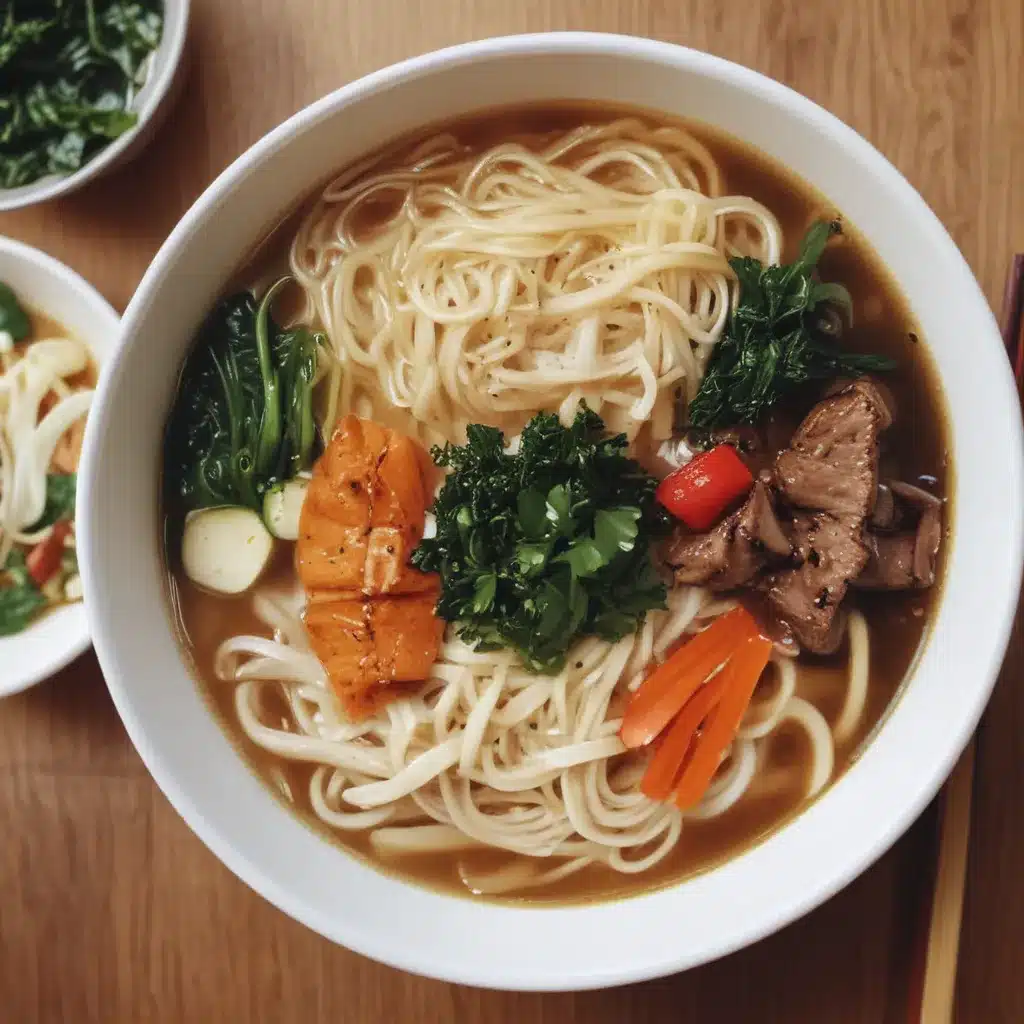
The Allure of Korean Noodle Soups
I’ll never forget the first time I slurped down a steaming bowl of Korean noodle soup. It was a blustery winter day in Boston, and I had wandered into a cozy little Korean joint near Chinatown, desperate for something to warm my frozen bones. As I stepped through the doors, the aroma of simmering broths and aromatic spices enveloped me, instantly transporting me to the bustling streets of Seoul.
I approached the counter, captivated by the vibrant array of noodle dishes on the menu. Should I go for the classic Japchae, with its sweet and savory glass noodles? Or perhaps the hearty Budae Jjigae, a spicy “army base stew” brimming with sausage, spam, and melty cheese? In the end, I decided to throw caution to the wind and try the Jjamppong – a seafood-laden noodle soup that promised to pack a serious flavor punch.
The first sip was a revelation. The broth, a complex blend of anchovy, kelp, and gochugaru (Korean chili flakes), danced on my tongue, simultaneously comforting and invigorating my senses. The chewy noodles, adorned with plump shrimp, calamari, and crisp vegetables, provided a satisfying textural contrast. It was like a hug for my soul, and I knew in that moment that I had discovered something truly special.
From that day on, I’ve been on a mission to explore the depths of Korean noodle soup cuisine, traversing the vibrant culinary landscape of Boston in search of the most soul-stirring bowls. And let me tell you, the city does not disappoint. Whether you’re craving the rich and comforting Kongbap, the fiery Kimchi Ramyeon, or the delicate Kalguksu, there’s a Korean noodle dish out there to suit every palate and mood.
Exploring the Diversity of Korean Noodle Soups
One of the things that truly fascinates me about Korean noodle soups is the sheer diversity of flavors and preparations. Each dish is a unique expression of Korean culinary tradition, reflecting the country’s rich history, regional influences, and cultural identity.
Take the Jjamppong, for example. This spicy seafood noodle soup is believed to have originated in the coastal city of Busan, where the briny bounty of the East Sea inspired creative cooks to combine local produce with imported Chinese noodles. The result is a symphony of flavors, with the savory, umami-packed broth providing a luscious backdrop for the chewy noodles and an array of fresh-from-the-sea ingredients.
But the Jjamppong is just the tip of the iceberg when it comes to Korean noodle soup diversity. We have the Kalguksu, with its delicate handmade wheat noodles in a clear, subtly flavored broth; the Kongbap, a hearty rice and bean noodle soup that’s a staple of Korean temple cuisine; and the Kimchi Ramyeon, a fiery instant noodle dish that’s a beloved comfort food for many Koreans.
Each of these soups has its own unique history, flavor profile, and cultural significance. And as I’ve explored the Korean noodle soup scene in Boston, I’ve been consistently amazed by the creativity and attention to detail that goes into every bowl.
Seeking Out the Best Korean Noodle Soups in Boston
Of course, as a self-proclaimed Korean noodle soup aficionado, I’m always on the hunt for the most exceptional examples the city has to offer. And let me tell you, Boston does not disappoint.
One of my absolute favorite spots is Korean Garden, a cozy little restaurant tucked away in the heart of Allston. Their Budae Jjigae, a hearty stew that blends spicy Korean flavors with American influences like SPAM and hot dogs, is an absolute knockout. The broth is rich and complex, with a perfect balance of heat and umami, and the assortment of proteins and vegetables creates a satisfying, almost indulgent experience.
But Korean Garden isn’t the only standout in Boston’s Korean noodle soup scene. Over in Cambridge, I’ve been thoroughly impressed by the Kalguksu at Soondubu. The noodles are delicate and silky, and the broth is so clear and pure, it’s almost like drinking liquid gold. And for a truly unique twist on the classic, you have to try the Kongbap at Gan Soon, a temple-style rice and bean noodle soup that’s as comforting as it is nutritious.
As I’ve explored these various establishments, I’ve been struck by the passion and dedication of the chefs and owners. They’re not just serving up delicious food; they’re preserving and elevating the rich culinary traditions of Korea, sharing their love and expertise with the Boston community.
The Therapeutic Power of Korean Noodle Soups
But the appeal of Korean noodle soups goes beyond just their exceptional flavors. For me, there’s a deeper, almost therapeutic quality to these dishes that makes them so beloved.
Perhaps it’s the way the steaming broth and chewy noodles seem to wrap you in a warm embrace, soothing both your body and your soul. Or maybe it’s the ritual of slurping down each spoonful, a meditative act that allows you to fully savor every nuanced flavor.
Whatever the reason, there’s no denying the restorative power of a well-crafted Korean noodle soup. Whether I’m battling a nasty winter cold, nursing a post-workout ache, or just feeling a bit down in the dumps, a comforting bowl of Kongbap or Jjamppong always seems to do the trick.
And I’m not the only one who’s discovered this magical healing property. Over the years, I’ve met countless Bostonians who have come to rely on Korean noodle soups as a source of comfort and sustenance, a surefire way to lift their spirits and nourish their bodies.
It’s a testament to the timeless allure of these dishes, and a reminder that great food has the power to transcend the purely physical, touching our hearts and souls in profound ways.
Conclusion: Embracing the Joys of Korean Noodle Soup
As I reflect on my journey of discovering the wonders of Korean noodle soups in Boston, I’m filled with a deep sense of gratitude and wonder. These dishes have become not just a culinary obsession, but a source of joy, comfort, and cultural connection.
Whether I’m slurping down a steaming bowl of Jjamppong on a chilly winter day or savoring the delicate flavors of a Kalguksu on a sultry summer evening, each experience is a reminder of the power of food to bring people together, to transport us to different times and places, and to nourish our bodies and souls.
So, if you’re in the mood for a truly transcendent culinary adventure, I urge you to venture out and explore the vibrant world of Korean noodle soups in Boston. Who knows – you might just find your new favorite comfort food, and maybe even a little bit of healing along the way.
